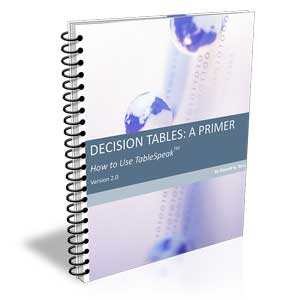Measuring Quality and Defects in the Knowledge Economy
Everyone wants high quality from their business processes. But what exactly does quality mean these days? Let me tell you a quick story that recently got me thinking.
I like to eat toasted raisin bread in the morning. I even have a favorite brand. Every morning when I'm at home I eat several pieces. Over the years I've become so experienced with the brand's quality that I can spot defects. I know when they've laid on the cinnamon a little too heavily, or when the dough didn't rise quite enough. Every morning I look forward to doing my little AM taste test.
But one morning recently I suddenly realized the large majority of client processes we've worked with over the last decade are not ones I can perform any taste test for. There's nothing physical from the process I can taste or hear or touch. There's nothing whatsoever to directly assess quality by.
That's because some clients simply have no physical products at all — e.g., insurance, finance, taxation, etc. But a good number do — e.g., electrical equipment, trucking, railroads, and so on. For these latter clients the processes of immediate concern didn't directly involve those physical things however — only just white-collar stuff.
So the question becomes how do you assess quality from a business process when there's no physical product? How do you identify defects when there isn't any physical result?
My conclusion: When there isn't any physical product from a business process, quality and defects are purely a matter of business rules. If you're not documenting and managing business rules as part of your BPM or quality management approach (or elsewhere) you're missing a crucial part of the picture.
Quality must be viewed very differently in the white-collar world. The traditional view simply doesn't fit.
In Henry Ford's day, for example, central to the concept of mass production was standardization of parts. That idea leads directly to the notion of manufacturing tolerances — i.e., upper and lower limits for parts in 3-dimensional space. The goal is to ensure physical interchangeability of physical parts. That idea is now standard practice, of course, across manufacturing and production sectors.
But what are the 'parts' in white-collar work? White-collar processes simply don't deal with physical things. How can you identify tolerances for them in 3-dimensional space? You can't! In a very real sense, the 'parts' in white-collar work are literally just bits and bytes.
If not tolerances as a basis for quality, then what's the proper focus? My answer: consistency and reliability of results.
For example, if I visit ten different branches of the same bank about getting a mortgage for my dream home, shouldn't I get the same answer on my application from all 10 branches?! As you probably know, that's not the way it works in many banks today. So one aspect of quality in white-collar work is the consistency and reliability of operational business decisions.
Another aspect of quality concerns compliance. Every business is subject to ever-growing numbers of (take a deep breath here) … acts, laws, statutes, regulations, contracts, MOUs, agreements, terms & conditions, deals, bids, deeds of sale, warranties, prospectuses, citations, certifications, receipts, legal notices … and the list goes on. Shouldn't I expect consistency and reliability of results with respect to all those obligations and commitments? I believe we should. If it's not about quality, then what?!
My expanded conclusion: When there isn't any physical product from a business process, quality and defects must be measured by consistency and reliability of results, which are in turn always purely a matter of business rules.For further information, please visit BRSolutions.com
# # #
About our Contributor:
Online Interactive Training Series
In response to a great many requests, Business Rule Solutions now offers at-a-distance learning options. No travel, no backlogs, no hassles. Same great instructors, but with schedules, content and pricing designed to meet the special needs of busy professionals.










How to Define Business Terms in Plain English: A Primer
How to Use DecisionSpeak™ and Question Charts (Q-Charts™)
Decision Tables - A Primer: How to Use TableSpeak™
Tabulation of Lists in RuleSpeak®: A Primer - Using "The Following" Clause
Business Agility Manifesto
Business Rules Manifesto
Business Motivation Model
Decision Vocabulary
[Download]
[Download]
Semantics of Business Vocabulary and Business Rules